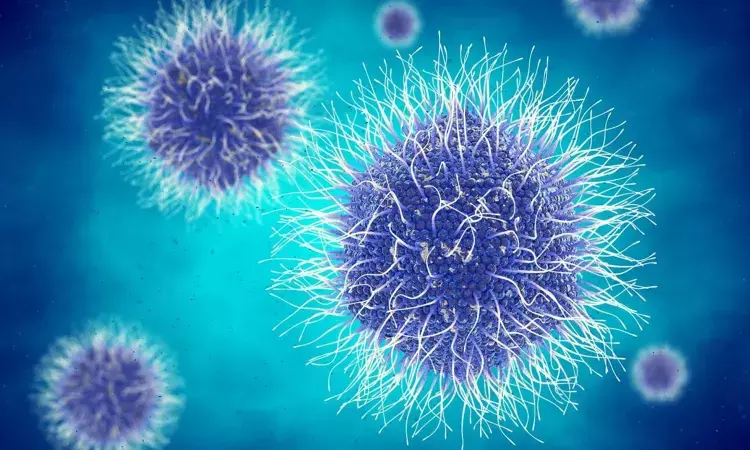- Home
- Medical news & Guidelines
- Anesthesiology
- Cardiology and CTVS
- Critical Care
- Dentistry
- Dermatology
- Diabetes and Endocrinology
- ENT
- Gastroenterology
- Medicine
- Nephrology
- Neurology
- Obstretics-Gynaecology
- Oncology
- Ophthalmology
- Orthopaedics
- Pediatrics-Neonatology
- Psychiatry
- Pulmonology
- Radiology
- Surgery
- Urology
- Laboratory Medicine
- Diet
- Nursing
- Paramedical
- Physiotherapy
- Health news
- Fact Check
- Bone Health Fact Check
- Brain Health Fact Check
- Cancer Related Fact Check
- Child Care Fact Check
- Dental and oral health fact check
- Diabetes and metabolic health fact check
- Diet and Nutrition Fact Check
- Eye and ENT Care Fact Check
- Fitness fact check
- Gut health fact check
- Heart health fact check
- Kidney health fact check
- Medical education fact check
- Men's health fact check
- Respiratory fact check
- Skin and hair care fact check
- Vaccine and Immunization fact check
- Women's health fact check
- AYUSH
- State News
- Andaman and Nicobar Islands
- Andhra Pradesh
- Arunachal Pradesh
- Assam
- Bihar
- Chandigarh
- Chattisgarh
- Dadra and Nagar Haveli
- Daman and Diu
- Delhi
- Goa
- Gujarat
- Haryana
- Himachal Pradesh
- Jammu & Kashmir
- Jharkhand
- Karnataka
- Kerala
- Ladakh
- Lakshadweep
- Madhya Pradesh
- Maharashtra
- Manipur
- Meghalaya
- Mizoram
- Nagaland
- Odisha
- Puducherry
- Punjab
- Rajasthan
- Sikkim
- Tamil Nadu
- Telangana
- Tripura
- Uttar Pradesh
- Uttrakhand
- West Bengal
- Medical Education
- Industry
Antenatal Choline helps lower effects of Covid-19 on newborns: Study

A new study published in the Journal of Psychiatric Research recommends that pregnant women should take choline during this coronavirus pandemic to protect newborn from risk of Covid 19.
New York- Researchers in the Departments of Psychiatry and Obstetrics and Gynecology at the University of Colorado Anschutz Medical Campus have found that pregnant women who take extra choline supplements may mitigate the negative impact that viral respiratory infections, including COVID-19 on their babies .
Choline is a vitamin B nutrient found in various foods and dietary supplements and is critical to fetal brain development.
"The Centers for Disease Control and Prevention (CDC) predicts that Covid-19 will impact fetal brain development like other common corona respiratory viruses," said study lead author Robert Freedman from the University of Colorado in Canada.
The study, published in the Journal of Psychiatric Research, specifically looked at whether higher prenatal choline levels helped protect the developing brain of fetus even if the mother contracted a viral respiratory infection during early pregnancy.
It has revealed higher prenatal choline levels mitigate the impact of virus infection.
The research team analysed the effects of mother's respiratory virus infection on infant's behaviour by measuring the infant's IBQ-R Regulation dimension, which looks at the development of infant attention and other self-regulatory behaviours.
Lower IBQ-R Regulation at one year of age is associated with problems in attention and social behaviour in later childhood, including decreased reading readiness at four years and problems in concentration and conscientiousness through seven years of age.
The study also showed infants of mothers who had viral infections and higher choline levels had significantly increased 3-month IBQ-R scores against infants of mothers who had viral infections and lower choline levels. Choline levels sufficient to protect the fetus often require dietary supplements.
The increased maternal anxiety and depression in the viral-infected mothers were not associated with their infants' IBQ-R Regulation.
According to the study, phosphatidylcholine or choline supplements along with other prenatal vitamins may help buffer the fetal brain from the possible detrimental impact of Covid-19 and decrease the risk of future mental illness.
"Previous pandemics have resulted in significantly increased levels of mental illnesses, including schizophrenia, autism, spectrum disorder and attention-deficit disorder in the offspring," said study researcher Camille Hoffman.
For further reference log on to:
Medical Dialogues Bureau consists of a team of passionate medical/scientific writers, led by doctors and healthcare researchers. Our team efforts to bring you updated and timely news about the important happenings of the medical and healthcare sector. Our editorial team can be reached at editorial@medicaldialogues.in.
Dr Kamal Kant Kohli-MBBS, DTCD- a chest specialist with more than 30 years of practice and a flair for writing clinical articles, Dr Kamal Kant Kohli joined Medical Dialogues as a Chief Editor of Medical News. Besides writing articles, as an editor, he proofreads and verifies all the medical content published on Medical Dialogues including those coming from journals, studies,medical conferences,guidelines etc. Email: drkohli@medicaldialogues.in. Contact no. 011-43720751


